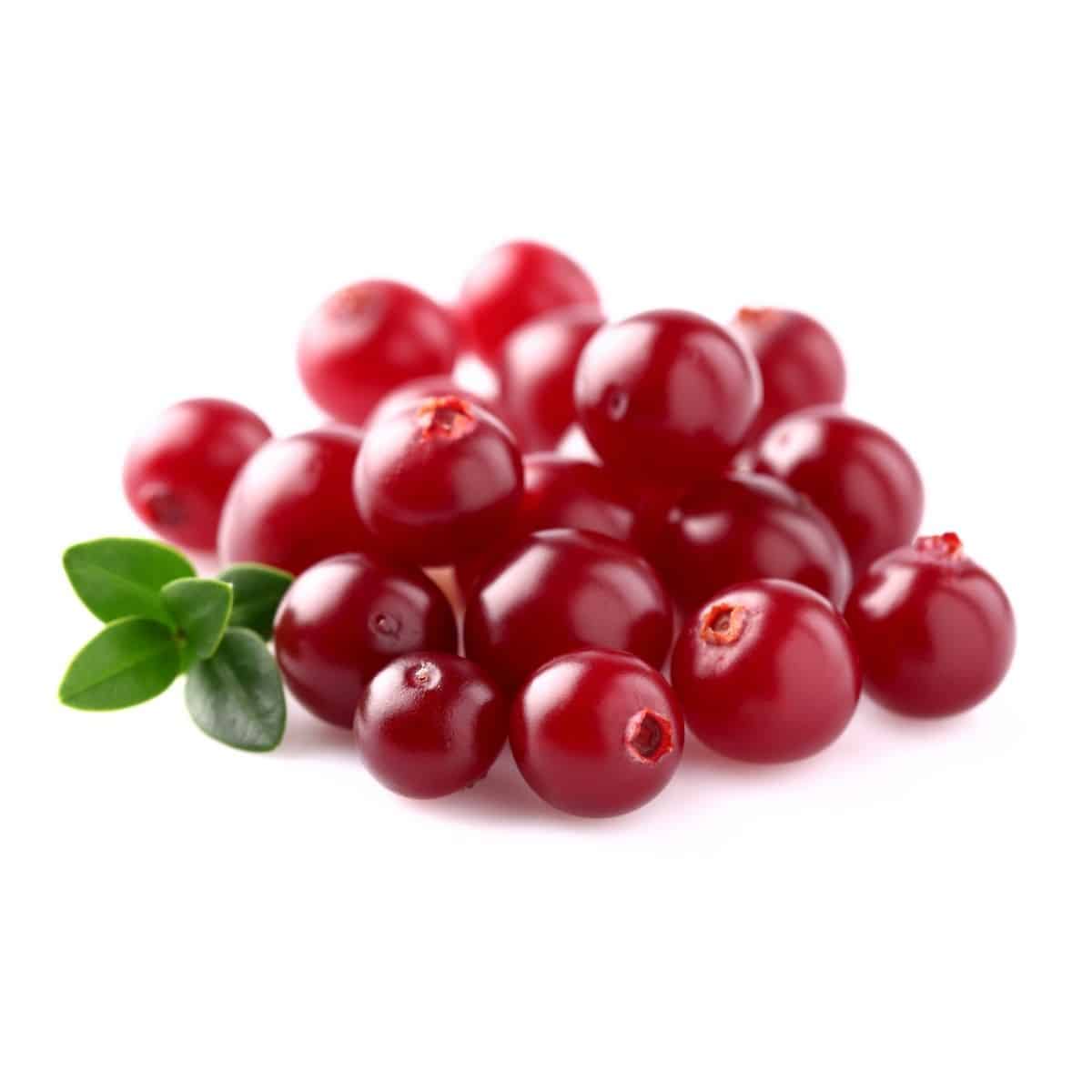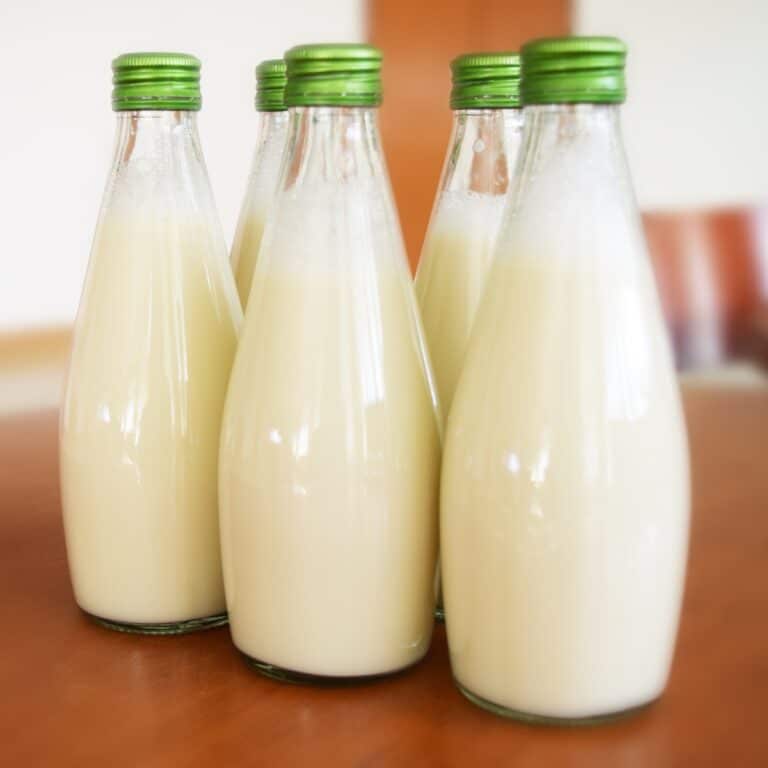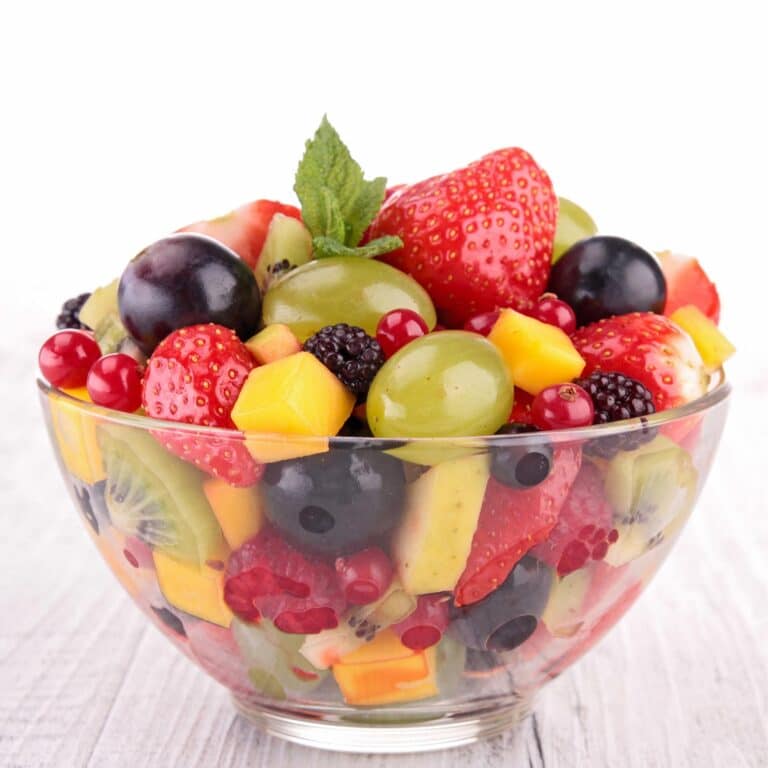Is Cranberry Good For Kidneys?
Cranberry has been long-used to treat and prevent urinary tract infections, but did you know that it might also have potential benefits for your kidneys?
Cranberry's antioxidant properties could help protect the delicate tissue of your kidneys from damage. In this article, we'll explore how cranberries can help keep your kidneys healthy and happy.

Are you curious about what kind of impact cranberries can have on your renal health? Do you want to learn more about how regular consumption of cranberry juice or supplements may benefit those with existing kidney issues? If so, then don't miss out on this comprehensive overview!
We'll discuss the evidence behind cranberries' purported effects on our kidneys as well as any possible side effects that come along with consuming them.
Keep reading to find out just how powerful a role cranberries can play in protecting our most important organ from chronic kidney disease.
Jump to:
- What Are Cranberries and What Are Their Health Benefits?
- How Do Cranberries Help Kidney Health?
- Nutritional Value
- Cranberry Juice Benefits
- Cranberry Supplement Benefits
- Cranberry Juice Side Effects
- Interactions With Medication
- Cranberry Uses and Recipes
- What Is The Recommended Intake Of Cranberries?
- What Are The Alternatives To Cranberries?
- Blueberries
- Raspberries
- Apples
- What Is The Potassium In This Fruit?
- Dried Cranberries
- FAQs for Eating Cranberries on a Renal Diet
- Enjoy Cranberries With Your Renal Diet
What Are Cranberries and What Are Their Health Benefits?
Cranberries are a type of small, red berry that are packed with nutrition. They're also a great source of vitamins C, A, and K, as well as dietary fiber for people with kidney disease.
They also contain antioxidants and other beneficial compounds. When it comes to health benefits, cranberries provide protection against urinary tract infections, heart disease, and cancer.
Last but not least, cranberries have been linked to improved kidney health. They are also low in protein, sodium and potassium, which makes them suitable for your renal diet and to prevent kidney failure (how does kidney failure affect the body?).
How Do Cranberries Help Kidney Health?
Cranberry juice is a great way to help improve kidney health due to its high content of antioxidants and vitamins. It can help reduce inflammation and also protect cells from damage due to clinical studies.
Taking cranberry supplements can also provide kidney health benefits, including improved function and reduced risk of infection.
Cranberries are also known to be an effective way to prevent urinary tract infections, due to their ability to prevent bacteria from sticking to the walls of the bladder.
Taking cranberry supplements can be especially beneficial for those who suffer from recurrent urinary tract infections. Lastly, cranberries can help reduce the risk of kidney stones by increasing urine volume and acidifying the urine.

Nutritional Value
Nutritional Information For Cranberries
Plain raw cranberries are the best, but you might think they are a little tart. Add some Splenda or sugar, depending on your condition, and sweeten them up a little.
1 cup whole cranberries, raw - 44 calories, 0.4 grams of Protein, 11.6 grams of Carbohydrate, 2 mg Sodium, 81 mg Potassium
⅓ cup dried, sweetened cranberries - 102 calories, 0 grams Protein, 27.2 grams of Carbohydrate, 1 mg Sodium, 13 mg Potassium
½ in thick slice cranberry sauce, jellied, canned - 86 calories, 0.1 grams Protein, 22.2 grams of Carbohydrate, 17 mg Sodium, 15 mg Potassium
Cranberry Juice Benefits
Cranberry juice is a great source of kidney health benefits! Many people drink it as part of their daily routine, and there's a good reason for that.
Cranberries contain powerful extracts that can help prevent kidney disease, as well as provide proanthocyanidins which are known to be effective against certain types of bacteria which can cause infection in the kidneys or bladder. This may even lower the risk of recurrence by helping strengthen immunity.
This could be beneficial if you suffer from recurring urinary tract infections or other ailments associated with the urinary tract. Not only does this reduce symptoms but it may even lower the risk of recurrence by helping strengthen immunity.
Cranberries certainly do offer some very impressive benefits when it comes to prevention of kidney conditions! And who doesn't want that? After all, taking care of our kidneys is an important step towards living a long and happy life.
Cranberry Supplement Benefits
Studies have shown that cranberry supplements can reduce inflammation in the kidneys, potentially slowing the progression of CKD.
In addition to their potential benefits for kidney health, cranberry supplements are also rich in antioxidants, which can help protect the body against damage from free radicals.
Free radicals are unstable molecules that can cause damage to cells and contribute to the development of chronic diseases.
If you're looking to give your kidneys some extra love and care then why not try adding a daily dose of cranberry supplements? It could be the perfect way to make sure both you and your kidneys stay happy and healthy for years to come.
It is important to note that cranberry supplements may not be suitable for all kidney patients, particularly those with a history of kidney stones. Cranberry supplements contain high levels of oxalate, which can contribute to the formation of kidney stones.
Individuals with a history of kidney stones should avoid cranberry supplements or consult with their healthcare provider before taking them.
Cranberry Juice Side Effects
Cranberry juice has both beneficial effects and possible side effects. Studies have found that cranberries may help to prevent urinary tract infections, but there is also evidence to suggest that too much of the drink or supplements can be damaging for your kidneys.
Dosing recommendations are important when considering taking cranberry products as they could lead to kidney damage if taken in excessive amounts or without consulting a doctor first.
Research suggests that drinking large amounts of cranberry juice could negatively affect kidney function due to its high oxalate content.
However, further research is needed to determine any long-term risks associated with regular use of the beverage or supplements.
It's always best to consult with your healthcare provider before using cranberry products, especially those containing other ingredients like sugar which can increase the risk of adverse reactions.
Interactions With Medication
It's essential to be aware of the potential risks associated with taking cranberry products, as it could interact with certain medications or worsen existing kidney-related conditions.
For those seeking natural remedies for treating infections or other health issues, understanding how cranberries can impact your body is key.
If you're currently on any medication that might interact with cranberries, talk to your doctor before consuming the drink or supplements. It's also important to note that those who have existing kidney diseases should avoid drinking large amounts of juice due to its high oxalate content and possible side effects on kidney function.
While there are many reported benefits from using cranberry based products, always take caution when incorporating them into your routine in order to ensure safe consumption practices and optimal results.
Cranberry Uses and Recipes
As far as uses go, cranberries can be eaten fresh or dried, and they can be used to make juice, jams, and sauces. They're also great for baking and adding to salads. Here are a few easy recipes to incorporate cranberries in your renal diet:
Recipe: Cranberry Smoothie
Ingredients:
- 1 cup fresh or frozen cranberries
- ½ cup low-potassium fruit (strawberries, blueberries, raspberries)
- ½ cup unsweetened almond milk
- ½ cup plain Greek yogurt
- 1 tablespoon honey (optional)
Instructions:
- Combine all ingredients in a blender and blend until smooth.
- Add more almond milk if needed to reach desired consistency.
- Serve immediately.
Recipe: Cranberry Salad
Ingredients:
- 2 cups mixed greens
- ½ cup sliced cucumbers
- ½ cup sliced bell peppers
- ¼ cup dried cranberries
- 2 tablespoon balsamic vinaigrette
Instructions:
- Combine all ingredients in a large bowl and toss to combine.
- Serve immediately.
Recipe: Cranberry Oatmeal
Ingredients:
- ½ cup rolled oats
- 1 cup water
- ¼ cup dried cranberries
- 1 tablespoon honey (optional)
- ¼ cup low-potassium nuts (almonds, walnuts)
Instructions:
- In a small saucepan, bring the water to a boil.
- Add the oats and reduce the heat to low.
- Cook for 5-7 minutes, stirring occasionally, until the oats are tender and the water has been absorbed.
- Stir in the dried cranberries and honey (if using).
- Top with low-potassium nuts and serve
These are just a few ways to add cranberries to your renal diet.

What Is The Recommended Intake Of Cranberries?
Living a healthy lifestyle is essential for keeping our kidneys functioning properly. Eating right and drinking plenty of fluids (fluids to hydrate with kidney disease) are key elements when it comes to maintaining the health of your urinary tract. This includes adding cranberries to your daily nutrition!
Cranberries have long been known as one of nature’s best-kept secrets for fighting urinary infections and other conditions that can affect the urinary system.
Studies have shown that just two ounces of cranberry juice each day, or even 600-800 mg capsules containing concentrated amounts of cranberry extract, could help protect you against future urinary tract infections..
What Are The Alternatives To Cranberries?
You really can eat lots of cranberries, especially the fresh ones, on a renal diet. Around the holidays, you can even find them in the produce section of the grocery store.
Are berries high in potassium? They may seem a little tart, so if you want to add some sugar or sugar substitute to them, feel free! But what if you don't like cranberries?
You can eat other low potassium fruits that are "berries" - blueberries, blackberries and strawberries. You can grab those in the same section of the grocery store and with a little rinse off - you are ready to pop them in your mouth and munch down.
But, if you don't like berries, and you need something fruity for your renal diet, pick out some of the fresh apples in the fruit / produce section.
Knowing that year round there are plenty of varieties of apples, from green to red and tart to sweet, anything for your tastebuds! Eat them fresh, they are low potassium fruits and can satisfy a sweet tooth.
Blueberries
Are blueberries good for your kidneys? Blueberries are a great alternative to cranberries for kidney protection. Blueberries are also packed with antioxidants, blueberries can help protect our kidneys from damage and disease.
Plus, they have fewer adverse reactions than cranberries — so you don't need to worry about any unwanted side effects! When it comes to nutrition facts, one cup of fresh blueberries contains 84 calories, 20 grams of carbohydrates, 2 grams of protein and 4 grams of dietary fiber.
They're also an excellent source of vitamin C and manganese. As far as health benefits go, eating blueberries regularly has been linked to improved heart health, better blood sugar control, weight loss and even reducing the risk of certain types of cancer.
All in all, if you're looking for a tasty way to keep your kidneys healthy without consuming cranberries, then blueberries should be at the top of your list!
Raspberries
In addition to blueberries, raspberries are also a great choice for renal patients. They contain many of the same antioxidants and nutrients found in blueberries, but they also have their own unique set of potential health benefits.
In terms of nutrition facts, one cup of fresh raspberries contains around 64 calories, 15 grams of carbohydrates, 1 gram of protein and 8 grams of dietary fiber. Plus, like blueberries there aren't any known significant side effects associated with consuming them.
All in all, if you're looking for a tasty way to keep your kidneys healthy while getting some added nutritional value then adding raspberries to your diet is definitely worth considering!
Apples
So if you're looking for a different type of fruit to get some added nutritional value, why not try apples?
With a vast variety of apple varieties available from Granny Smiths to Pink Ladies, there's sure to be one that suits your taste.
Not only are they delicious and juicy when eaten raw, but there are tons of recipes out there for baking with apples as well! In terms of nutrition facts, one medium-sized apple contains around 95 calories, 25 grams of carbohydrates, 0.3 grams fat and 4 grams of dietary fiber.
Apples are naturally low in sodium, which is important for renal patients who need to manage their blood pressure and fluid balance.
Apples also contain many essential vitamins like Vitamins C and E which can help protect against cardiovascular disease and reduce inflammation. Eating apples may even improve brain function too!
What Is The Potassium In This Fruit?
Cranberries are considered a low-potassium fruit, with approximately 45 mg of potassium per 100 grams of fruit. This makes them a good choice for kidney patients who need to limit their potassium intake.
When the kidneys are not functioning properly, they may not be able to remove excess potassium from the body, which can lead to high levels of potassium in the blood (hyperkalemia).
High levels of potassium can be dangerous and can cause symptoms such as muscle weakness, irregular heartbeat, and even heart attack.
Therefore, it is important for kidney patients to limit their intake of high-potassium foods (low potassium diet for kidney disease) and choose low-potassium alternatives, such as cranberries.
Dried Cranberries
Dried cranberries are a tasty and a convenient way to enjoy the health benefits of cranberries, as they are also full of vitamins, antioxidants, and fiber.
Dried cranberries are easy to store and are a great snack option on their own. They can also be used in a variety of recipes , such as salads, oatmeal, and baked goods.
Although dried cranberries can offer many potential health benefits for your kidneys, it's important to be aware of the dangers associated with consuming them too much. Their high sugar content may increase risk of diabetes-related complications.
Therefore, it is important for renal patients to work with their healthcare provider or a registered dietitian to determine the appropriate amount of these foods to include in their diet.
FAQs for Eating Cranberries on a Renal Diet
Overconsumption of cranberries can contribute to the formation of calcium oxalate kidney stones, due to their high oxalate content. Renal patients are already at a higher risk of developing kidney stones, and consuming cranberries can increase this risk even further. However, this shouldn’t discourage you from eating cranberries in moderation.
It's also important to keep in mind that too much cranberry juice can lead to stomach upset and diarrhea. Always be mindful of any potential allergic reactions, so it's always best to consult with your doctor before consuming cranberry juice.
In addition to the risk of kidney stones, cranberries can also interact with certain medications that renal patients may be taking.
For example, there are a few reports that cranberries might possibly interfere with blood thinners, such as warfarin, and increase the risk of bleeding.
It's also important to keep in mind that too much cranberry juice can lead to stomach upset and diarrhea. Lastly, it's important to be mindful of potential allergic reactions.
Although there is some evidence that the dietary intake of cranberries may reduce the risk of damage to kidneys, medical advice should be sought before making any changes in diet or opting for alternative treatments.
Believe it or not, there is a big difference between fresh and canned cranberries! Canned cranberries, especially those in syrup or sauce, contain added sugars that increase their calorie content.
Additionally, fresh cranberries have a higher water content, which can contribute to a feeling of fullness and aid in hydration.
Canned cranberries may contain higher levels of sodium due to added preservatives or salt.
This can be a concern for people with high blood pressure or kidney issues, so it's essential to check the label for sodium content when choosing canned cranberries.
Furthermore, the canning process can cause a significant loss of vitamin C in canned cranberries. Make sure you are able read labels carefully as a kidney patient.
Other vitamins, such as vitamin A, vitamin K, and some B vitamins, may also be reduced in canned cranberries compared to their fresh counterparts.
In short, always opt for fresh cranberries when possible, as they generally offer higher nutritional value and vitamin content compared to canned cranberries.
However, canned cranberries can still be a convenient and nutritious option when fresh cranberries are not available as long as they are used in moderation.
Cranberries are naturally low in sugar, but some cranberry products, such as cranberry juice cocktail, may contain added sugar. It is important for kidney patients to choose low-sugar cranberry products (low sodium low sugar breakfast)or consume cranberries in their natural form.
For example, unsweetened cranberry juice or dried cranberries without added sugar can be a healthy and nutritious addition to the diet of kidney patients who are on a low-sugar diet.
It is important for kidney patients to work with their healthcare provider or a registered dietitian to determine the appropriate amount of cranberries and other foods to include in their diet.
Enjoy Cranberries With Your Renal Diet
Incorporating cranberries into a renal diet(renal diet breakfast, lunch dinner) can offer numerous health benefits for individuals with kidney-related issues. Rich in antioxidants, vitamins, and minerals, cranberries can help reduce inflammation, prevent urinary tract infections, and promote overall kidney health.
However, it is essential to consume cranberries in moderation, as excessive intake may lead to high potassium and phosphorus levels, which can be harmful to those with kidney disease.
Ultimately, I recommend consulting with a renal dietitian or health care professional, so you can determine the appropriate serving size and frequency of cranberry consumption tailored to your specific needs.


















Hello. I was wondering if we can eat cranberry sauce and hot flaked pepper dried?? And hot sauce in bottle. Thank you for your time.